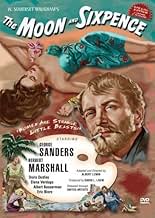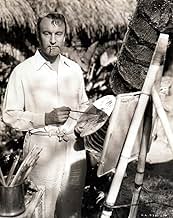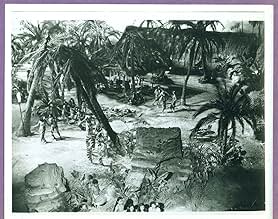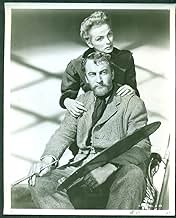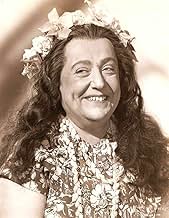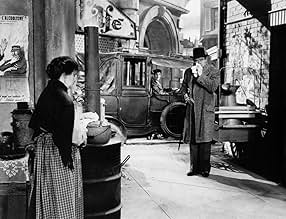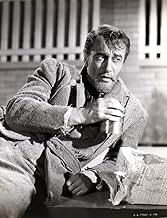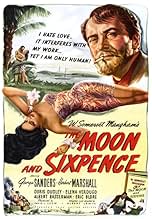Loosely inspired by Gauguin's life, the story of Charles Strickland, a middle-aged stockbrocker who abandons his middle-class life, his family, and his duties to start painting, as he has al... Read allLoosely inspired by Gauguin's life, the story of Charles Strickland, a middle-aged stockbrocker who abandons his middle-class life, his family, and his duties to start painting, as he has always wanted to do. He is from then on a awful human being, wholly devoted to his ideal: be... Read allLoosely inspired by Gauguin's life, the story of Charles Strickland, a middle-aged stockbrocker who abandons his middle-class life, his family, and his duties to start painting, as he has always wanted to do. He is from then on a awful human being, wholly devoted to his ideal: beauty.
- Director
- Writers
- Stars
- Nominated for 1 Oscar
- 4 wins & 2 nominations total
- Dirk Stroeve
- (as Steve Geray)
- Native Boy at Wedding
- (uncredited)
- Man Seated in Paris Dive
- (uncredited)
- Tiare's Cook
- (uncredited)
- Party Guest
- (uncredited)
- Maitland - Wolfe's Valet
- (uncredited)
- The Leper
- (uncredited)
- Col. Fred MacAndrew
- (uncredited)
- Amy Strickland
- (uncredited)
- Tough Bill
- (uncredited)
- French Floozie
- (uncredited)
- Director
- Writers
- All cast & crew
- Production, box office & more at IMDbPro
Featured reviews
Sanders is perfectly cast as the insensitive and coldly indifferent Strickland who really just wants to be left alone. He asks for nothing but exploits kindness to its fullest when forced upon him, especially by the artist Stroeve. In a leading man of the era's hand the role would more than likely have been diluted and suffered but with Sanders you get a bored condescension and disdainful inflection like no other.
Unfortunately the rest of Sixpence lags a good distance behind Sander's spot on performance. Director Albert Lewin employs very little scope and camera movement with little attention payed to set design and lighting. The sepia tint of the film washes out in some scenes and was more than likely employed by Lewin to display Strickland's magnum opus at the end but even this disappoints.
Herbert Marshall is dry and drab as the narrator and the rest of the cast flat and stiff. Combined they lack the life and conviction to be found in Sander's performance which might have even soared further had Lewin applied the expressionistic flourishes to be found in his The Picture of Dorian Gray a far more successful picture with a less secure actor.
It is an interesting film. Certainly a curiosity. The unusual use of different film stocks and the selective use of color make it a unique experience.
The subject of the film, a misanthropic painter who offers little in the way of redeeming value, makes the film an interesting story with a hollow center. Charles Strickland (George Sanders) is a man who sacrifices everything in life to retire to Tahiti to paint. Based loosely on the life of Gaugin, the film has an interesting cast of characters that surround Strickland, notably Herbert Marshall as Geoffrey Wolfe and Steven Geray as Dirk Stroeve.
One might feel compelled to watch the story of so unusual a protagonist, but he is not merely indifferent to others; he often goes out of his way to denigrate or insult them. When we finally see the artwork that has driven this man's obsession--if that's what it is--it is anticlimactic.
This work of fiction could have made Strickland a hero, fighting for his artistic vision. Instead, he comes across as little more than a craftsman who does even value his own work. This is disappointing.
As in the later "The Razor's Edge," Maugham, here also played by Herbert Marshall, serves as narrator for most of the film. Sanders is the unpleasant, self-involved Charles Strickland, a stock broker who deserts his family and leaves London to go to Paris and become a painter. There he meets Dirk Stroeve (Geray), who becomes a friend. When Strickland becomes ill, Stroeve over the strong objections of his wife Blanche (Dudley) moves Strickland to their home to nurse him back to health. Stroeve then gets the impression that his wife is in love with Srrickland, and that Strickland has no intention of leaving. So he throws him out. His wife says that she's leaving with him. Stroeve leaves instead.
Strickland eventually tires of Blanche and then leaves for Tahiti. There he continues to paint and even falls in love with a native girl, Ata (Elena Verdugo). There Dr. Coutras (Bassermann) picks up the narration.
As the unapologetic user obsessed with his work, George Sanders is excellent. Like many in the studio system, he was typecast into playing one type of role, but he was capable of so much more. Another revelation in this film is Eric Blore, who was always typecast as a butler. Here he is a different kind of character and is absolutely wonderful. Herbert Marshall does not register much in what is basically a thankless role - he had more to do in The Razor's Edge.
Good movie. If this and Lust for Life are any indication, Gauguin, even if this character just hints at him, was a most unpleasant character.
Did you know
- TriviaHerbert Marshall plays the writer Geoffrey Wolfe, a fictional alter ego of author W. Somerset Maugham. Marshall played Somerset Maugham in Le fil du rasoir (1946), and appeared in several adaptations of Maugham's works, including Le Voile des illusions (1934) and both the 1929 and 1940 versions of La Lettre (1940).
- GoofsStrickland mispronounces Papeete (the capital of Tahiti) as "Pah-peet-ee". The correct pronunciation, as any resident of Tahiti would know, is "Pah-pay-ay-tay".
- Quotes
Geoffrey Wolfe: Why will you never let me meet your husband?
Amy Strickland: He's not at all literary - he'd probably bore you to death.
Geoffrey Wolfe: Does he bore you?
Amy Strickland: I happen to be his wife: I'm very fond of him. He doesn't pretend to be a genius. In fact, he doesn't even make very much money on the stock exchange. But he's awfully good and kind.
Geoffrey Wolfe: I think I should like him very much.
- Alternate versionsThere is a tinted and a color sequence toward the end of the film, both of which have recently been restored, but for many years this film was seen only in black-and-white.
- ConnectionsReferenced in Spring in Park Lane (1948)
- SoundtracksWe, Three Kings of Orient Are
(uncredited)
Traditional
- How long is The Moon and Sixpence?Powered by Alexa
Details
Box office
- Budget
- $401,000 (estimated)
- Runtime
- 1h 29m(89 min)
- Aspect ratio
- 1.37 : 1

